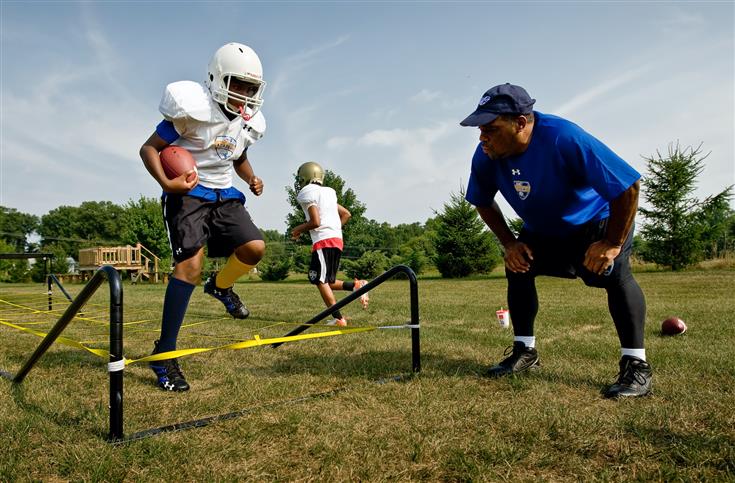Hey there, sports enthusiasts! Are you looking for a comprehensive guide on football practice for kids? Well, you’ve come to the right place. In this article, we will dive deep into the world of football practice for kids, covering everything from the importance of practice to fun drills and exercises, essential equipment, nutrition tips, and much more. So, whether your little one is a budding football star or just starting out, this guide will help you make the most out of their practice sessions. Let’s kick off this exciting journey into the world of football practice for kids!
Why Football Practice is Important for Kids
Football practice is not just about running around on the field and kicking a ball; it plays a crucial role in the overall development of children. Here are some key reasons why football practice is essential for kids:
- Physical Fitness: Football practice helps kids stay active and physically fit. Running, dribbling, and kicking the ball all contribute to improving their cardiovascular health, strength, and coordination.
- Teamwork: Being part of a football team teaches kids the value of teamwork, cooperation, and communication. They learn to work together towards a common goal, which is a vital skill both on and off the field.
- Motor Skills: Playing football helps children develop their motor skills, including hand-eye coordination, balance, and agility. These skills are essential for overall physical development.
- Discipline and Focus: Football practice instills discipline in kids as they have to follow rules, listen to their coach, and commit to regular practice sessions. It also helps them improve their focus and concentration.
- Social Skills: Being part of a football team allows kids to socialize, make new friends, and build lasting relationships. It teaches them important social skills such as empathy, communication, and conflict resolution.
- Confidence Boost: Mastering new skills, scoring a goal, or making a great play on the field can do wonders for a child’s self-esteem and confidence. Football practice provides ample opportunities for kids to shine and boost their self-confidence.
- Healthy Lifestyle: By engaging in regular football practice, kids develop a love for sports and physical activity, which can encourage them to lead a healthy and active lifestyle in the long run.
How to Prepare for Football Practice
Before heading to football practice, it’s essential to ensure that your child is well-prepared both physically and mentally. Here are some tips to help them prepare for a productive practice session:
- Proper Attire: Make sure your child wears comfortable clothing and appropriate football gear, including cleats, shin guards, and a water bottle. Dressing in layers is also a good idea to adjust to changing weather conditions.
- Warm-up: Encourage your child to warm up before practice to prevent injuries and prepare their muscles for intense physical activity. Dynamic stretches, light jogging, and jumping jacks are excellent warm-up exercises.
- Hydration: Staying hydrated is crucial during physical activity, so remind your child to drink plenty of water before, during, and after practice. Dehydration can affect performance and lead to fatigue.
- Healthy Snack: Provide your child with a light and nutritious snack before practice to fuel their energy levels. Opt for snacks rich in carbohydrates and protein, such as fruits, whole-grain crackers, or yogurt.
- Positive Mindset: Encourage your child to approach practice with a positive attitude and mindset. Remind them that making mistakes is part of the learning process, and the most important thing is to have fun and give their best effort.
Essential Equipment for Football Practice
Having the right equipment is essential for a successful football practice session. Here are some must-have items for kids participating in football practice:
- Cleats: Proper football cleats provide traction and support on the field, helping kids move comfortably and reduce the risk of slips and falls.
- Shin Guards: Protecting the shins is vital in football to prevent injuries from kicks and collisions. Make sure your child wears well-fitted shin guards under their socks during practice.
- Water Bottle: Staying hydrated is key during physical activity, so ensure your child carries a refillable water bottle to practice and drinks an adequate amount of water.
- Appropriate Clothing: Comfortable and breathable clothing that allows free movement is ideal for football practice. Opt for moisture-wicking fabrics to keep your child dry and comfortable.
- Football: Of course, a football is a must-have for football practice! Make sure your child’s ball is the right size for their age group and is properly inflated.
Fun Drills and Exercises for Kids
Making football practice fun and engaging is essential to keep kids motivated and excited about the sport. Here are some fun drills and exercises that you can incorporate into your child’s practice sessions:
- Dribbling Relay Race: Set up a relay race where kids dribble the ball through a series of cones or markers. This drill not only improves dribbling skills but also adds an element of competition.
- Passing Circle: Have the players stand in a circle and pass the ball to each other. This drill enhances passing accuracy, communication, and teamwork.
- Shooting Drills: Set up a goal and practice shooting from different angles and distances. Encourage kids to aim for specific targets to improve their accuracy and power.
- Cone Dribbling: Create a course with cones for kids to dribble through using various techniques such as inside and outside of the foot dribbling. This drill helps improve ball control and footwork.
- Juggling Challenge: Challenge kids to see how many times they can juggle the ball without it touching the ground. Juggling improves coordination, touch, and focus.
Importance of Warm-up and Cool Down
Warm-up and cool down are essential components of a football practice routine that should not be overlooked. Here’s why they are crucial:
- Warm-up: A proper warm-up prepares the body for physical activity by increasing blood flow to the muscles, raising body temperature, and improving flexibility. It helps prevent injuries and enhances performance during practice.
- Cool Down: Cooling down after intense physical activity helps the body transition from exercise to a state of rest. It reduces muscle soreness, prevents injury, and promotes recovery by gradually lowering the heart rate and stretching tired muscles.
Building Skills and Techniques
Football practice provides an excellent opportunity for kids to develop and improve their skills and techniques. Here are some key skills that kids can work on during practice sessions:
- Dribbling: Practice various dribbling moves such as inside cut, outside cut, and step-over to improve ball control and footwork.
- Passing: Work on different passing techniques including short passes, long passes, chips, and driven passes to enhance accuracy and vision on the field.
- Shooting: Practice shooting with both feet from different distances and angles to improve shooting accuracy, power, and technique.
- Heading: Teach kids proper heading technique, focusing on timing, jump height, and contact point to safely and effectively head the ball.
- Defending: Practice defensive skills such as marking, jockeying, tackling, and intercepting the ball to become a solid defender on the field.
- Goalkeeping: If your child is interested in goalkeeping, focus on skills such as positioning, shot-stopping, catching, and distribution to develop their goalkeeping abilities.
Nutrition and Hydration Tips
Proper nutrition and hydration play a significant role in supporting kids’ performance during football practice. Here are some essential tips to keep in mind:
- Pre-Practice Meal: Encourage your child to have a balanced meal rich in carbohydrates, protein, and healthy fats 2-3 hours before practice. Avoid heavy, greasy, or sugary foods that can cause stomach discomfort.
- Snack Options: Provide your child with light snacks such as fruit, granola bars, yogurt, or whole-grain crackers 30-60 minutes before practice to top up their energy levels.
- Hydration: Remind your child to drink water throughout the day leading up to practice and to bring a water bottle to stay hydrated during the session. Avoid sugary drinks that can cause dehydration.
- Post-Practice Recovery: After practice, offer your child a snack or meal that combines carbohydrates and protein to aid muscle recovery. Chocolate milk, a turkey sandwich, or a smoothie are excellent post-practice options.
- Nutrient-Dense Foods: Include nutrient-dense foods such as fruits, vegetables, whole grains, lean proteins, and dairy in your child’s diet to support their overall health and performance.
Dealing with Injuries and Safety Measures
Injuries are a common concern in sports, including football. Here’s how you can deal with injuries and ensure safety during football practice:
- First Aid Kit: It’s essential to have a first aid kit on hand during practice with basic supplies such as bandages, antiseptic wipes, ice packs, and adhesive tape to address minor injuries.
- Proper Technique: Emphasize the importance of using proper technique and form during practice to prevent injuries. Teach kids to tackle, shoot, and move on the field in a safe and controlled manner.
- Rest and Recovery: If your child sustains an injury during practice, encourage them to rest, apply ice to reduce swelling, and seek medical attention if needed. Allow proper time for recovery before returning to practice.
- Warm-up and Stretching: Ensure that your child warms up properly before practice and incorporates stretching exercises to improve flexibility and prevent muscle strains.
- Hydration: Proper hydration is crucial for injury prevention, as dehydration can impair muscle function and increase the risk of cramps and injuries. Remind your child to drink water regularly during practice.
Mental Preparation and Confidence Building
In addition to physical skills, mental preparation and confidence building are key aspects of football practice for kids. Here are some tips to help your child develop mental resilience and confidence on the field:
- Positive Self-Talk: Encourage your child to use positive self-talk to boost their confidence and overcome doubts or fears. Remind them to focus on their strengths and capabilities.
- Visualization: Encourage your child to visualize themselves performing well on the field, scoring goals, or making successful plays. Visualization can help build confidence and mental readiness.
- Goal Setting: Help your child set realistic and achievable goals for their practice sessions. Celebrate small victories and milestones to boost their confidence and motivation.
- Mistake Management: Teach your child that making mistakes is part of the learning process, and it’s essential to learn from them and move on. Emphasize the importance of resilience and perseverance.
- Mindfulness and Relaxation: Introduce mindfulness techniques such as deep breathing, visualization, or progressive muscle relaxation to help your child stay calm, focused, and confident during practice.
Setting Goals and Tracking Progress
Setting goals and tracking progress are essential for monitoring your child’s development and improvement in football practice. Here’s how you can establish goals and track their progress:
- SMART Goals: Encourage your child to set Specific, Measurable, Achievable, Relevant, and Time-bound (SMART) goals for their practice sessions. For example, improving dribbling skills or scoring a certain number of goals.
- Progress Journal: Have your child keep a practice journal where they can record their goals, achievements, challenges, and areas for improvement. Tracking progress can help them stay motivated and focused.
- Coach Feedback: Encourage your child to seek feedback from their coach on their performance during practice. Coaches can provide valuable insights and guidance for improvement.
- Celebrate Milestones: Celebrate small victories and milestones with your child to acknowledge their progress and boost their confidence. Positive reinforcement can motivate them to continue working towards their goals.
- Adjust Goals: Periodically review and adjust goals based on your child’s progress and changing skill levels. Setting new challenges will keep them engaged and committed to their development.
Maintaining Fun and Enthusiasm in Practice
Keeping practice sessions fun and engaging is crucial to ensuring that kids remain enthusiastic and motivated about football. Here are some tips to maintain a positive and enjoyable practice environment:
- Variety of Drills: Incorporate a variety of drills, exercises, and games into practice to keep things interesting and challenging for kids. Mix up individual, partner, and team activities to cater to different preferences.
- Friendly Competition: Organize friendly competitions, races, or challenges during practice to spark excitement and encourage healthy competition among players. Offer rewards or incentives for extra motivation.
- Interactive Training: Use interactive training tools such as cones, hurdles, agility ladders, and mini goals to add variety and enhance skills development during practice.
- Team Building Activities: Plan team-building activities or exercises that promote bonding, cooperation, and communication among players. Building a strong team dynamic can make practice more enjoyable and foster camaraderie.
- Positive Reinforcement: Praise and encourage your child and their teammates for their efforts, improvements, and achievements during practice. Positive reinforcement boosts self-esteem and keeps kids motivated.
FAQs
1. How often should kids practice football?
It’s recommended for kids to practice football at least 2-3 times a week to develop their skills, fitness, and understanding of the game. However, the frequency can vary based on age, level of play, and individual goals.
2. What should kids eat before football practice?
Before football practice, kids should eat a balanced meal containing carbohydrates, protein, and healthy fats to fuel their energy levels. Opt for foods like whole grains, lean proteins, fruits, and vegetables.
3. How can I help my child stay motivated during football practice?
To help your child stay motivated during football practice, set realistic goals, celebrate their achievements, provide positive reinforcement, and make practice sessions fun and engaging. Encourage their passion for the sport.
4. What are some common football practice injuries in kids?
Common football practice injuries in kids include sprains, strains, muscle pulls, bruises, and fractures. It’s essential to emphasize proper technique, warm-up, and safety measures to prevent injuries.
5. How can I encourage teamwork during football practice?
To encourage teamwork during football practice, organize team-building activities, emphasize communication and cooperation, promote a positive team environment, and lead by example. Emphasize the importance of supporting and trusting teammates.
6. How important is hydration during football practice for kids?
Hydration is crucial during football practice for kids to prevent dehydration, maintain performance, and regulate body temperature. Encourage kids to drink water before, during, and after practice and avoid sugary or caffeinated beverages.
Conclusion
And there you have it, a comprehensive guide to football practice for kids! By following the tips and strategies outlined in this article, you can help your child make the most out of their football practice sessions. Remember, football practice is not just about developing physical skills; it’s also about building character, teamwork, confidence, and a love for the game. So lace up those cleats, grab a ball, and get ready to kick-start your child’s football journey. Football Practice For Kids, here we come!



